Before you load your horse in a horse trailer and head toward your destination, it’s important to take the time to make sure your travels will be safe ones. Not only do you want to make sure your horse is safe and comfortable, but you also want to ensure that the trailer and all of its connections are secure and working properly. Here are 8 smart safety tips to follow when using a horse trailer.
1. Check to Make Sure the Trailer Lights are Working
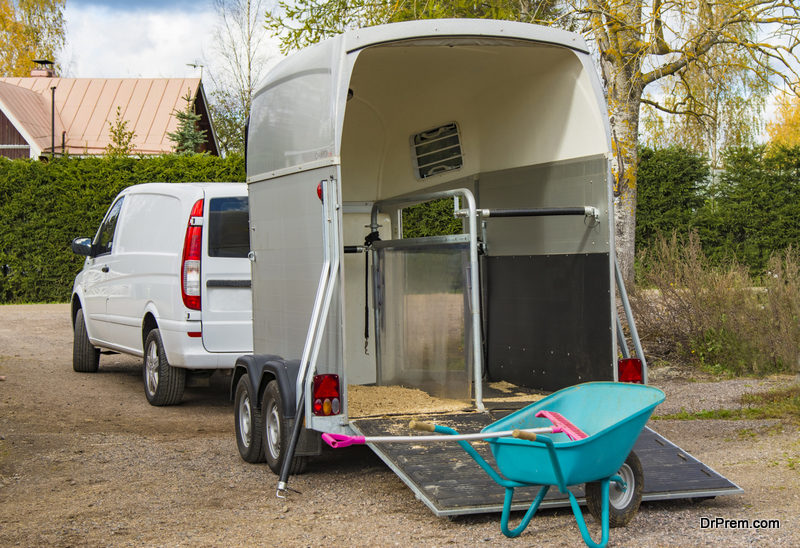 After you hook up the horse trailer and plug it into your vehicle, you’ll need to make sure that the trailer’s lights are working. First, do a quick visual check see if the running lights are working on the trailer. Then, ask someone nearby to stand by the trailer while you get in the vehicle and test the brakes and blinkers. While you’re at it, check your tires for signs of unusual wear and note the tire pressure, too.
After you hook up the horse trailer and plug it into your vehicle, you’ll need to make sure that the trailer’s lights are working. First, do a quick visual check see if the running lights are working on the trailer. Then, ask someone nearby to stand by the trailer while you get in the vehicle and test the brakes and blinkers. While you’re at it, check your tires for signs of unusual wear and note the tire pressure, too.
2. Consider Adding Mirror Extenders to Your Tow Vehicle
Being able to see what’s going on behind you is key when pulling a horse trailer. Although you can use the regular side mirrors your vehicle is equipped with, they probably won’t provide you with the best view. Consider adding mirror extenders to your vehicle, which you can easily put in place and remove as needed.
3. Practice Loading and Unloading Your Horse Ahead of Time
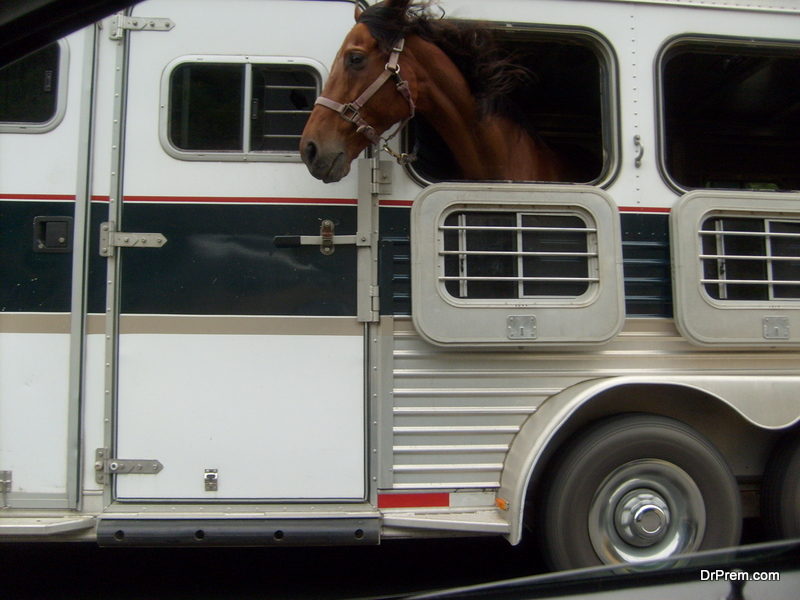 This is especially important for owners of new horse trailers because horses can become uneasy or skittish with unfamiliar objects. Take the time to load and unload your horse at home where the stress of other people, animals and traffic is at a minimum. Then, when you do have load and unload, your horse will hopefully be much calmer and more cooperative.
This is especially important for owners of new horse trailers because horses can become uneasy or skittish with unfamiliar objects. Take the time to load and unload your horse at home where the stress of other people, animals and traffic is at a minimum. Then, when you do have load and unload, your horse will hopefully be much calmer and more cooperative.
4. Hydrate Your Horse Ahead of the Trip
Depending on the weather, a horse trailer can become hot. When a horse becomes hot and begins sweating, dehydration is a possible outcome. It’s important to hydrate your horse well before you embark on a long trip. Some vets recommend giving horses an oral electrolyte supplement in advance in the form of a gel, paste or powder.
5. Keep the Window Safety Bars Closed
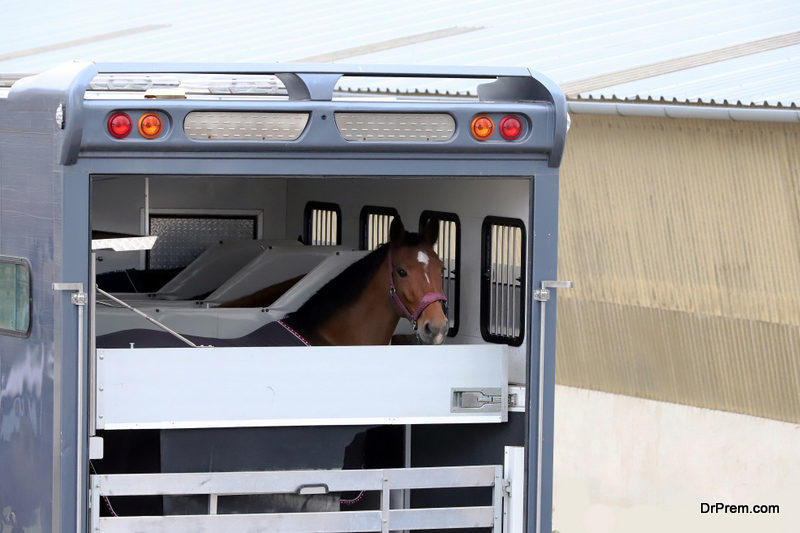 Like dogs, horses will hang their heads out the window if they have the opportunity. The problem with this practice is that the horse is exposed to flying debris, which could cause injury to its head or eyes. Plus, in an accident, the horse will be less protected from ejection. The best choice is to keep the window safety bars closed.
Like dogs, horses will hang their heads out the window if they have the opportunity. The problem with this practice is that the horse is exposed to flying debris, which could cause injury to its head or eyes. Plus, in an accident, the horse will be less protected from ejection. The best choice is to keep the window safety bars closed.
6. Drive With Caution
Pulling a trailer is much different than driving a vehicle with nothing attached. You’ll need to allow extra space between you and other drivers on the road in case you need to brake suddenly. Additionally, when you’re pulling out of a parking lot into a busy highway or merging onto a freeway, you need to consider that it will take you much longer than usual to get up to speed than if you weren’t pulling a trailer. If you experience swaying of the trailer while driving, take your foot off the gas and let the vehicle slow down by itself so that you can regain control. Do not step on the brakes or you could lose control.
7. Avoid Leaving Your Horse Unattended
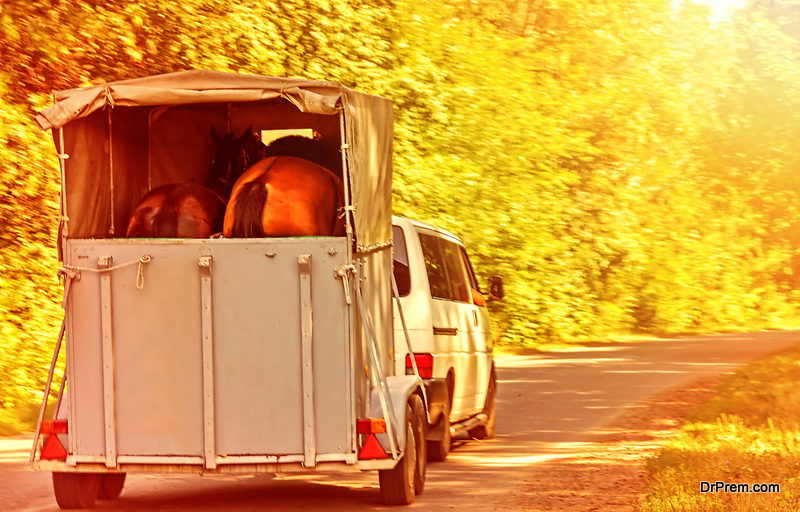 No matter what, it’s not a good idea to leave your horse unattended when the doors or windows are open in the trailer. Horses can panic, and if they do, they might try to launch themselves through the open window or door, which could result in injury to the animal, the trailer or people nearby.
No matter what, it’s not a good idea to leave your horse unattended when the doors or windows are open in the trailer. Horses can panic, and if they do, they might try to launch themselves through the open window or door, which could result in injury to the animal, the trailer or people nearby.
8. Clean the Trailer Regularly
Horses that are traveling long distances can experience trailer stress, and a dirty trailer full of manure and urine only serves to overwhelm a horse’s respiratory system. On extended trips, clean manure out of the trailer at each stop. When practical, hose out the trailer to rid it of all lingering waste.
9. Ventilate the Trailer
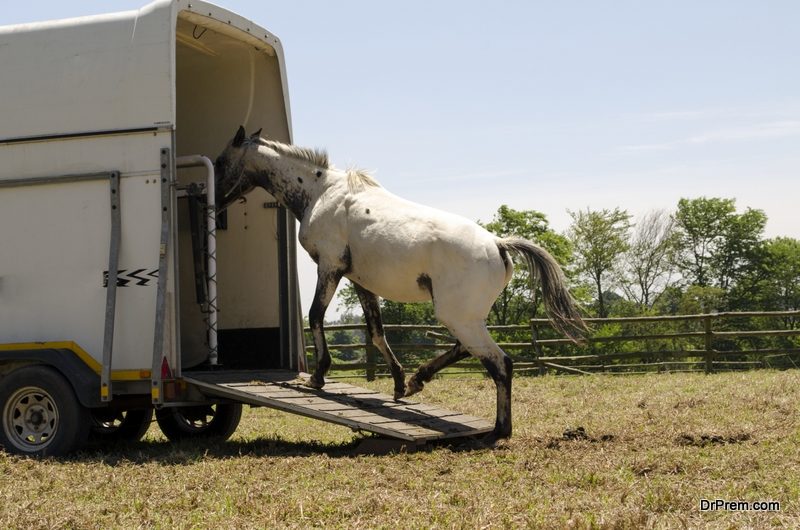 Avoid exposing your horse to inhumane conditions such as excessive heat, stagnant air and toxic exhaust fumes. Instead, leave air vents open, so that the horse can receive fresh air while traveling. In hot weather, it’s important not to stop for extended periods of time, otherwise the restriction of airflow could cause the horse to overheat. In cold weather, you can blanket your horse so it won’t become chilled.
Avoid exposing your horse to inhumane conditions such as excessive heat, stagnant air and toxic exhaust fumes. Instead, leave air vents open, so that the horse can receive fresh air while traveling. In hot weather, it’s important not to stop for extended periods of time, otherwise the restriction of airflow could cause the horse to overheat. In cold weather, you can blanket your horse so it won’t become chilled.
Article Submitted By Community Writer



